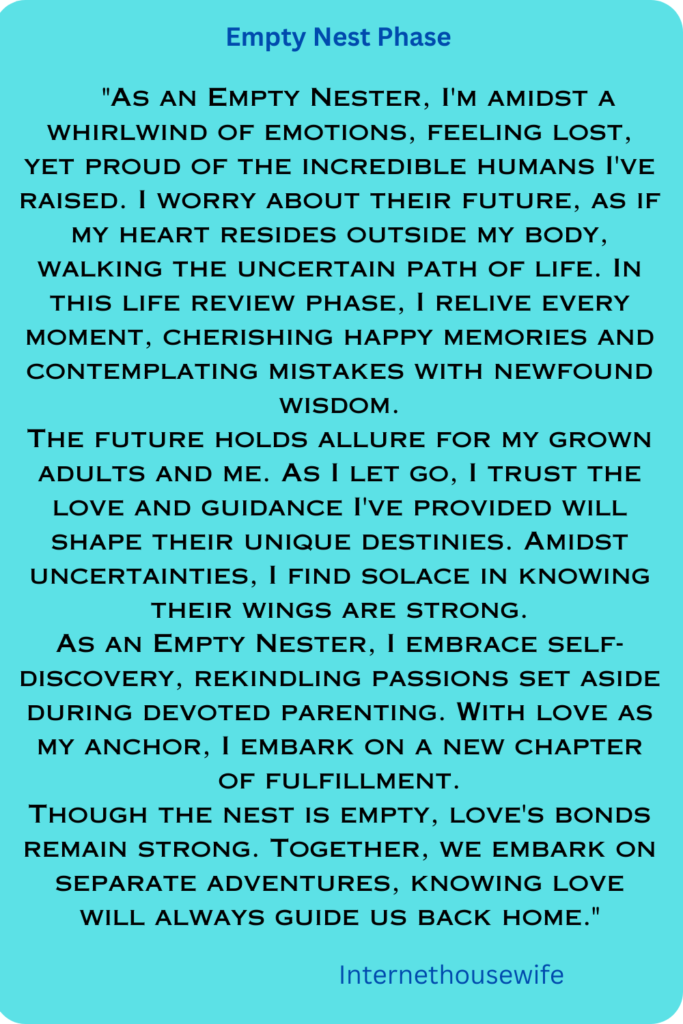How To Make It Through The Empty Nest Phase As A Parent
It can be challenging making it through The Empty Nest Phase of life, but with time and self-care, you can navigate this transition and find new meaning and fulfillment.
What Is the Empty Nest Syndrome Phase?
It is a phase or stage in life in which a parent is experiencing a sense of loss or emptiness after her children have moved out of the home and on to start their life.
A parent goes through emotional turmoil from being an active role in their children’s lives to feeling less needed with bouts of depression, sadness, and mood swings. They might miss the daily interactions, the shared moments, and the sense of purpose that came with being actively involved in their children’s lives.
Some parents may view this phase as an opportunity for personal growth, rekindling relationships, and pursuing new interests, while others find it a challenging period that requires time and self-care to adjust to the changes and find fulfillment in the next chapter of life.
Two Stages Of Empty Nest Phase
A negative Stage
The Empty Nest Phase can be an emotionally challenging and isolating time for some parents, as they grapple with feelings of emptiness, loss, and a sense of purposelessness without their children at home.
OR
A Positive Stage
This phase can be a joyous and fulfilling time for some parents, offering newfound freedom, opportunities for self-discovery, and a chance to reconnect with their partner and personal interests.
Tips to Help A Parent Through This Phase
Here are some tips to help you through this phase:
- Acknowledge and accept your feelings: It’s essential to recognize that feeling sad, lost, or lonely during this phase is normal. Allow yourself to experience and process these emotions without judgment.
- Stay connected with your children: While they may have left home, it’s crucial to maintain communication with your grown children. Find ways to connect regularly, whether through calls, texts, video chats, or visits. Share in their successes and offer support when needed.
- Rediscover your passions: Use this time as an opportunity to explore hobbies or interests that you may have set aside while raising your children. Rekindle old passions or discover new ones that bring you joy and fulfillment.
- Invest in self-care: Focus on your physical and emotional well-being. Engage in regular exercise, eat healthily, and prioritize sleep. Consider practices like meditation or yoga to help reduce stress and promote relaxation.
- Seek support from friends and family: Share your feelings with trusted friends or family members who may have experienced a similar phase in life. Their support and understanding can be invaluable during this time.
- Attend support groups or counseling: Consider joining support groups for Empty Nesters or seeking professional counseling if you find it challenging to cope with your emotions or adjust to this new phase.
- Embrace new opportunities: View this phase as a chance to try new experiences and embrace change. Travel, take up a course, volunteer, or pursue a new career path if it interests you.
- Maintain a routine: Establishing a daily or weekly routine can provide a sense of stability during this transitional period and help you stay focused on your goals.
- Set new goals: Define new aspirations and objectives for yourself. Setting and achieving personal goals can give you a sense of purpose and accomplishment.
- Cultivate new relationships: Socialize with other Empty Nesters or individuals who share similar interests. Building new connections can bring a sense of camaraderie and support during this phase.

How Long Will Empty Nest Stage Last?
The duration of the Empty Nest Phase can vary widely from one parent to another, depending on individual circumstances and factors. On average, this stage can last anywhere from a few months to several years. It typically begins when the last child leaves home, marking the end of active parenting, and continues until parents adjust to their new roles and find a sense of fulfillment and purpose in their post-parenting lives. Some parents may adapt more quickly, while others might take longer to transition into this new phase of life. Ultimately, the length of the Empty Nest Phase is unique to each person’s journey and how they navigate this significant life transition.






